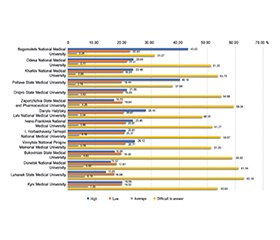Oral and General Health Том 5, №3, 2024
Вернуться к номеру
Стоматологічна освіта в Україні очима роботодавців через призму власного досвіду: сьогодення та перспективи
Авторы: I.P. Mazur (1, 2), N.V. Hasiuk (3), V.B. Radchuk (3), I.L. Skrypnyk (4)
(1) - Shupyk National Healthcare University of Ukraine, Kyiv, Ukraine
(2) - NGO “Ukrainian Dental Association”, Kyiv, Ukraine
(3) - I. Horbachevsky Ternopil National Medical University, Ternopil, Ukraine
(4) - Bogomolets National Medical University, Kyiv, Ukraine
Рубрики: Стоматология
Разделы: Клинические исследования
Версия для печати
Актуальність. Система освіти в Україні є прозорою, при формуванні засад її реалізації до уваги беруться відгуки всіх зацікавлених сторін — учасників освітнього процесу. Останні своїм баченням і думками за потреби здатні впливати на освітній процес та ініціювати зміни в ньому. Метою проведеного дослідження є моніторинг поглядів на якість навчання, рівень отриманих знань і практичних навичок лікарів-стоматологів у закладах вищої освіти через призму власного досвіду. Матеріали та методи. У дослідженні взяли участь 2216 респондентів, які заповнювали анкету на науково-практичних заходах фахових шкіл для стоматологів в онлайн-режимі у березні 2023 року. Отримані дані обробляли за допомогою ліцензійної програми StatSoft Inc. Застосовано аналітичний метод дослідження і структурно-логічний аналіз. Результати. За результатами опитування та подальшого моніторингу відсоткових даних стосовно якості підготовки лікарів-стоматологів згідно з освітньо-професійними програмами, які реалізують чотирнадцять закладів вищої освіти, визначено, що в десяти закладах рівень підготовки відповідає «високому». Найбільш затребуваною професійною компетенцією стоматолога після отримання диплома, на думку опитаних, є загальні навички щодо лікування основних стоматологічних захворювань у вигляді вміння проводити професійну гігієну, лікувати карієс і його ускладнення. На необхідності оволодіння ширшим діапазоном компетенцій наголосили близько 50 % осіб від загальної кількості опитаних. Найбільш затребуваними професійними якостями, які повинен мати майбутній стоматолог, були бажання та реалізація безперервного професійного розвитку і самовдосконалення, вміння визнавати професійні помилки, працювати в команді, впевненість та амбіційність. Висновки. За результатами опитування можна констатувати, що базовими навичками, які повинен мати стоматолог після завершення навчання, є вміння лікувати основні стоматологічні захворювання, що створює для стоматологів України передумови щодо продовження навчання, підтримки й поліпшення стандартів медичної практики шляхом вдосконалення знань, навичок і безперервного професійного розвитку.
Background. The education system in Ukraine is transparent; when forming the principles of its implementation, feedback from all participants in the educational process is taken into account. The latter, with their vision and thoughts, can influence and initiate changes in the educational process if necessary. The aim of the conducted research is to monitor views on the quality of education, the level of acquired knowledge and practical skills of dentists in institutions of higher education through the prism of their personal experience. Materials and methods. 2216 respondents participated in the study, filling out a questionnaire at scientific and practical events of professional schools for dentists in online mode in March 2023. The obtained data were processed using the StatSoft Inc. license program. Analytical research method and structural-logical analysis were applied. Results. Based on the results of monitoring the data regarding the quality of dentists’ training, it has been determined that level of training corresponds to “high” in ten institutions. Conclusions. The most sought-after professional competence of a dentist after obtaining a diploma is general skills in the treatment of basic dental diseases. The most sought-after professional qualities are the desire and implementation of continuous professional development and self-improvement, the ability to recognize professional mistakes, work in a team, confidence and ambitiousness. Basic skills are the ability to treat the main dental diseases, which creates the prerequisites for continuous professional development.
безперервний професійний розвиток; стоматологія; роботодавці; освітній процес
continuous professional development; dentistry; employers; educational process

